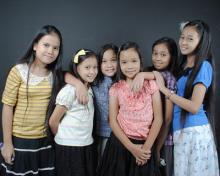
Social development involves learning the knowledge, skills, and values that enable children to relate to others effectively. This learning is achieved both directly by those who care for and teach them and indirectly through social relationships. A child’s social development begins soon after birth and continues through adolescence as he learns to effectively interpret social cues and respond to others around him in appropriate ways.1 The ability to get along with others and adapt to new situations is referred to as social competence.
Child development involves emotional, cognitive, social, and physical development as interrelated domains that influence each other. Children’s experiences in their earliest years affect how their brains work, the way they respond to stress, and their ability to form trusting relationships. Their thinking and language skills become more complex, and they begin to understand their own feelings and those of others.
In a positive environment, an infant develops an emotional bond with his caregivers. A secure attachment promotes a positive relationship with others and decreases the risk for social and emotional problems later in childhood.2 When parents are available and attuned to their child, the child feels a sense of security that creates a strong foundation for allowing that child to explore the world.3 As a child receives unconditional love and acceptance from his family, he is provided with a solid base for confidence and good self-esteem to build further social relationships with others.4
As children age, they develop their social skills and learn how to act in social settings through play. In 1932, sociologist Mildred Parten at the University of Minnesota’s Institute of Child Development developed a system for classifying social development through play by children that has been widely accepted. Her six stages were unoccupied play, solitary play, onlooker play, parallel play, associative play, and cooperative play. Her theory was that as children grew older with improved communication skills and more opportunities for interaction with other children, their solitary play would become more social.5
Parten’s categories provide guidelines for understanding how children move from playing alone to more social situations.6 Children will move through the six stages as they grow and develop, although they might not progress in a linear order. Depending on the children’s physical environment and their individual temperament, they may engage in different stages at different times.7
An initial form of playing, unoccupied play is described as the random movements an infant makes as he becomes aware of objects around him. Because toddlers have limited social, cognitive, and physical skills, their self-centered nature encourages them to engage in playing by themselves, exploring their world in solitary play. Onlooker play describes when children observe other children playing, but don’t join in with them. By the time children reach three years of age, they may engage in parallel play where they play independently, but side by side seemingly not involved with others. Parallel play is seen as an important bridge to the later stages of social play.8 Associative play also describes children playing separately from one another, but they are involved with what the others are doing. Cooperative play focuses on children working together to achieve a common goal, such as building a play structure, putting together a puzzle, or engaging in dramatic play.9
School-age children move from a self-centered view to an understanding of the importance of social rules to develop friendships.10 They are able to understand another’s point of view, which leads to empathy, caring, respect, and fairness. Friendships take a vital role for happiness during adolescence, and teenagers assign great importance to socializing with their friends.11
To understand the significance of the relationship between play and social development, several play theorists have made contributions to this study. Jean Piaget’s developmental theory emphasized cognitive development of children from birth to adolescence; however, he recognized the importance of peer relationships in developing social competence. Erik Erikson maintained that make-believe play permitted children to learn about their social world and was a vehicle for developing new social skills. Lev Vygotsky’s sociocultural theory suggested that pretend play helped children realize their play was influenced by social expectations, which helped them conform to the rules of play and develop self-regulation.12
- 1. “Social development.” KidsMatter. < http://www.kidsmatter.edu.au/mental-health-matters/social-and-emotional-learning/social-development > 18 Oct. 2016.
- 2. “What Do We Know About Social and Emotional Development in Early Childhood?” Urban Child Institute. < http://www.urbanchildinstitute.org/resources/publications/good-start/social-and-emotional-development > 18 Oct. 2016.
- 3. Stern, Susan. “The Importance of Attunement.” November 2009 – Volume 47 newsletter. The Social Skills Place, Inc. < http://socialskillsplace.com/archive/1109.newsletter.html > 23 May 2016.
- 4. Grace, Elizabeth. “Stages of Children’s Social Development.” Kids’ Development. < http://www.kidsdevelopment.co.uk/stageschildrenssocialdevelopment.html > 18 Oct. 2016.
- 5. Tomlin, Carolyn R. “Play: A Historical Review.” EarlychildhoodNEWS. < http://www.earlychildhoodnews.com/earlychildhood/article_view.aspx?ArticleID=618 > 9 June 2016.
- 6. Frost, Joe L., Sue Wortham, and Stuart Reifel. Play and Child Development. Upper Saddle River, NJ: Prentice-Hall, Inc. 2001.
- 7. Cecchini, Marie E. “Encouraging Cooperative Play.” EarlychildhoodNEWS. < http://www.earlychildhoodnews.com/earlychildhood/article_view.aspx?articleid=707 > 11 Oct. 2016.
- 8. Rock, Amanda. “10 Types of Play Important to Your Child’s Development.” Verywell. < https://www.verywell.com/types-of-play-2764587 > 11 Oct. 2016.
- 9. Op. cit., Cecchini.
- 10. Anderson-McNamee, Jona K. and Sandra J. Bailey. “The Importance of Play in Early Childhood Development.” Montana State University Extension. < store.msuextension.org/publications/HomeHealthandFamily/MT201003HR.pdf > 11 Oct. 2016.
- 11. Grace, Elizabeth. “General Stages of Social Development.” Kids’ Development. < http://www.kidsdevelopment.co.uk/StagesSocialDevelopment.html > 18 Oct. 2016.
- 12. Frost, Joe L., Sue Wortham, and Stuart Reifel. Play and Child Development. Upper Saddle River, NJ: Prentice-Hall, Inc. 2001. p. 182.

